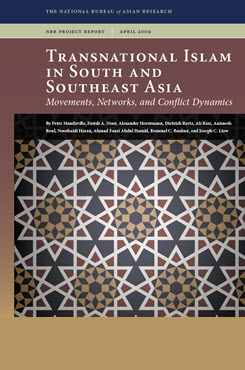From Transnational Islam in South and Southeast Asia: Movements, Networks, and Conflict Dynamics
Transnational Ideologies and Actors at the Level of Society in South and Southeast Asia
This paper examines key transnational Islamic movements and missionary networks active in South and Southeast Asia—the Indian Tablighi Jama’at (TJ), the Palestinian Hizb ut-Tahrir (HT), and Saudi Arabian Salafi movements. The paper looks at the structure and ideology of these movements, in general, giving particular attention to their embeddedness in everyday life. The paper observes these movements’ recruitment and training strategies as well as the patterns of socialization taking place within these movements.
EXECUTIVE SUMMARY
This paper examines key transnational Islamic movements and missionary networks active in South and Southeast Asia—the Indian Tablighi Jama’at (TJ), the Palestinian Hizb ut-Tahrir (HT), and Saudi Arabian Salafi movements. The paper looks at the structure and ideology of these movements, in general, giving particular attention to their embeddedness in everyday life. The paper observes these movements’ recruitment and training strategies as well as the patterns of socialization taking place within these movements. A global market has emerged in response to the phenomenal growth of these transnational movements wherein Islamic actors compete for followers and authority while local Muslim communities negotiate their ties with transnational Islamic networks.
MAIN FINDINGS
By joining transnational Islamic networks, Muslims from the most marginal societies in South and Southeast Asia are brought to the forefront of the globalized Islamic community. Participation in these movements gives downtrodden masses the status of faithful members of the umma, lending them prestige and psychological uplift. Transnational Islamic actors and movements contribute to the growing Islamization of society, the increased presence of Islam in public spaces, the individualization of Islam and Islamic piety, and the consumption of Islamic products in daily life. The TJ, HT, and Salafi movements strive to be the vanguard of the Islamic revolution throughout South and Southeast Asia. These movements attempt to build a truly Islamic society on the model of the Prophet Muhammad and his faithful followers. While the Tablighi Jama’at is a quietist, apolitical movement operating at the grassroots level, the political Hizb ut-Tahrir recruits its cadres from urban middle-class students. Both movements benefit from the growing presence and demands of a new generation of young Muslims, ages 18-25, who look for a total, encapsulating form of Islam as a modern solution to their problems and as a path to spiritual experience and strengthened piety. The growing presence of political Islamist and Salafi movements contributes to the rapid erosion of traditional Muslim elites’ authority as well as the increasing competition between traditional Sufi groups and modernizing reformist movements.
POLICY IMPLICATIONS
- Policymakers should avoid confusing transnational pietist movements with militant groups. While Islamic movements like the TJ and HT are political in their indoctrination methods, they are nonviolent. However, their rhetoric of hatred and anti-Americanism remains a topic of serious concern.
- Pietist movements should be given suitable channels for expression. Many Muslims suffer discrimination and political exclusion. Providing these communities with channels for expression will help Muslims openly fulfill their political and spiritual aspirations. Repressive measures will only create hatred and resentment.
- Involve transnational Islamic actors in the democratic process. When Islamic groups and movements enter the democratic process, they tend to develop more moderate and pragmatic approaches.
- In focusing on the global, policymakers should not lose sight of the local. Transnational Islamic ideas and movements such as the Muslim Brotherhood, TJ and HT are being localized and indigenized at the same time. Policymakers should be alert to local differences and realities in crafting effective and nuanced solutions.


